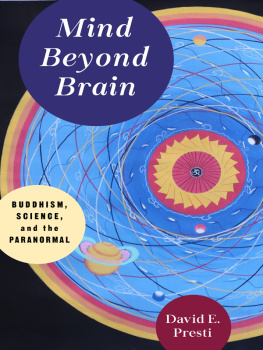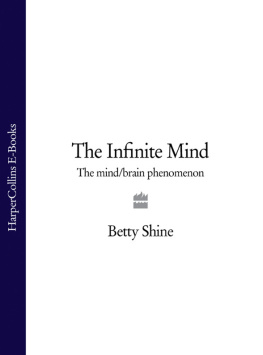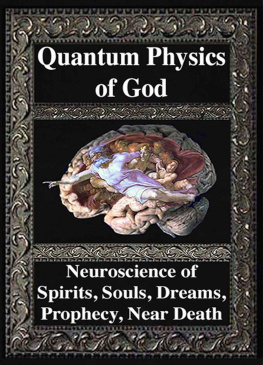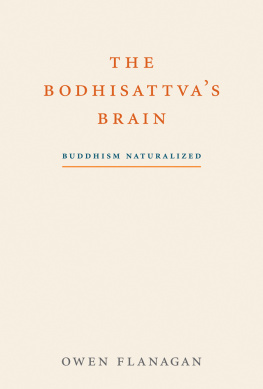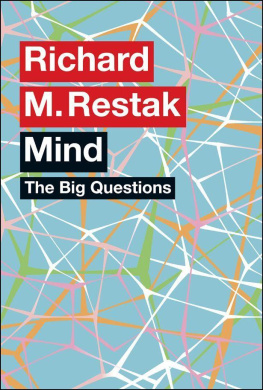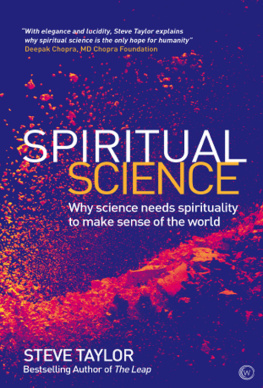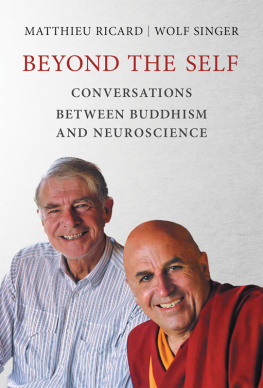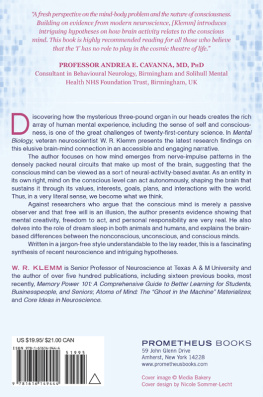Table of Contents
MIND BEYOND BRAIN
MIND BEYOND BRAIN
BUDDHISM, SCIENCE, AND THE PARANORMAL
DAVID E. PRESTI
WITH
BRUCE GREYSON, EDWARD F. KELLY, EMILY WILLIAMS KELLY, AND JIM B. TUCKER
Columbia University Press New York
Columbia University Press
Publishers Since 1893
New York Chichester, West Sussex
cup.columbia.edu
Copyright 2018 Columbia University Press
All rights reserved
E-ISBN 978-0-231-54839-7
Library of Congress Cataloging-in-Publication Data
Names: Presti, David E., editor.
Title: Mind beyond Brain : deepening the dialogue between science and Buddhism / [editors] David E. Presti with Bruce Greyson,
Edward F. Kelly,
Emily Williams Kelly, and Jim B. Tucker.
Description: New York : Columbia University Press, [2018] |
Includes bibliographical references and index.
Identifiers: LCCN 2018010141 (print) | LCCN 2018029059 (ebook) |
ISBN 9780231548397 (electronic) | ISBN 9780231189569 (cloth : alk. paper)
Subjects: LCSH: ParapsychologyReligious aspectsBuddhism. |
OccultismReligious aspectsBuddhism. | Religion and science. |
Buddhism.
Classification: LCC BQ4570.P75 (ebook) |
LCC BQ4570.P75 M56 2018 (print) |
DDC 294.3/365dc23
LC record available at https://lccn.loc.gov/2018010141
A Columbia University Press E-book.
CUP would be pleased to hear about your reading experience with this e-book at .
Cover design: Guerrilla Design
Cover illustration: Mandala painting by Anil Thapa,
Lumbini Buddhist Art Gallery, Berkeley, CA
The spectacular progress of the physical sciences since the seventeenth century was made possible by the exclusion of the mental from their purview. To say that there is more to reality than physics can account for is not a piece of mysticism: it is an acknowledgment that we are nowhere near a theory of everything, and that science will have to expand to accommodate facts of a kind fundamentally different from those that physics is designed to explain. It should not disturb us that this may have radical consequences. Materialism remains a widespread view, but science does not progress by tailoring the data to fit a prevailing theory.
Thomas Nagel
Science cannot solve the ultimate mystery of nature. And that is because, in the last analysis, we ourselves are part of nature and therefore part of the mystery that we are trying to solve.
Max Planck
There does not exist anything
That is not dependently arisen.
Therefore there does not exist anything
That is not empty.
Ngrjuna
CONTENTS
GESHE TENZIN WANGYAL RINPOCHE
DAVID E. PRESTI AND EDWARD F. KELLY
DAVID E. PRESTI
BRUCE GREYSON
JIM B. TUCKER
EMILY WILLIAMS KELLY
EDWARD F. KELLY
DAVID E. PRESTI
GESHE TENZIN WANGYAL RINPOCHE
W hen I first met a few years ago with the researchers who contributed to this book, I was excited to learn about their work. These different areas of studynear-death experiences, memories of past lives, apparitions, siddhisreflect a principle that Tibetan Buddhists have explored for centuries. We believe that mind is not just conditioned by the physical brain and body, or even by the properties of time and space. Mind is also beyond all these. Even after the dissolution of the physical body at the time of death, Tibetan Buddhists believe that mind persists and is reborn continuously into new forms.
Mainstream science has been slow to acknowledge the dimensions of study described in this book. Given the relevance of these topics to the contemporary encounter between Buddhism and science, in 2010, I invited these researchers to participate in a Buddhism-science conference at Serenity Ridge, Virginiathe retreat center where I focus my own worldwide efforts in research, study, and teaching (Ligmincha International). This setting permitted engaging in open, lively dialogue, and the presentations at that conference were the inspiration for this book.
This gathering was a realization of some of my own longtime interests. From age ten, I was trained as a Bn monk in Menri Monastery near Dolanji, India. I entered the Dialectic School at Menri, and after finishing twelve years of study there toward my geshe degree, I traveled to the West and discovered here a completely different world. I was excited to explore on an informal basis everything from psychology to neuroscience to quantum physics. In particular, I have always been interested in how ancient spiritual practices can bring about not only profound shifts in consciousness but also physical health benefits.
Around 1993 I met some clinicians at the University of Texas M.D. Anderson Cancer Center, and we opened discussions around the relationship between meditation practice and pain management. This eventually led to projects in which we observed the mental and physical effects of Tibetan practicesof the body (such as the Tibetan yogas of tsa lung and trul khor), of breath (various breathing and sound-healing exercises), and of mind (including meditation practices involving imagery and visualization)on the relief of suffering in cancer patients. I believe that practices of the body, breath, and mind will one day be acknowledged by conventional medicine as potent treatments for physical disease, and will be prescribed for specific bodily symptoms as well as to improve the health of the psyche.
The researchers in this book have been observing and cataloging unusual phenomena that are difficult or impossible to explain based on current scientific theory. Near-death experiences bring up the question of how we can reconcile a brain that appears not to be functioning with a mind functioning better than ever. Cases of the reincarnation type suggest that memories and emotions can carry over from one life to the next. Apparitions associated with death indicate that the process of dying may be far more interesting and revealing than simply the cessation of the physical functioning of the body. Investigation of extraordinary powers or attainments (siddhis) such as telepathy, clairvoyance, and psychokinesis presents yet another perspective on an expanded view of mind and reality.
It is well accepted in the Tibetan traditions that body, energy, and mind are inseparably related, and that the mind itself has extraordinary power not only to ease physical suffering and prevent and heal sickness, but also to dissolve the entire physical dimension. For example, through practices of wind (prana, chi, lung), one is able to deconstruct the energetic blockages within ones bodily tissues until those blockages dissolve and one enters a spacious state that is free of discord and pain. Enlightenment itself is said to come about when one deconstructs the dualistic sense of ego identity to the point that one attains a pure state of consciousness (kunzhi, the base of all consciousness) that is beyond all conceptuality and even physicality. In the Tibetan dzogchen tradition, there are records of people whose physical bodies at the time of death dissolved entirely or almost entirely into light, with the exception of hair, fingernails, and toenails. This highest attainment of dzogchen practice is known as the body of light, or rainbow body (

